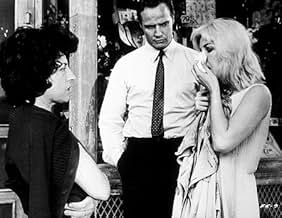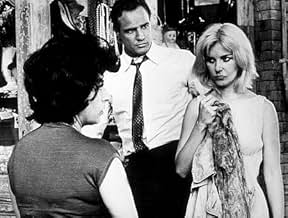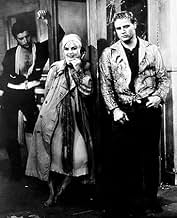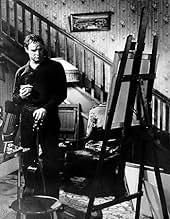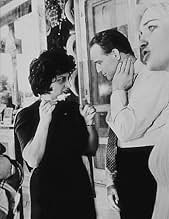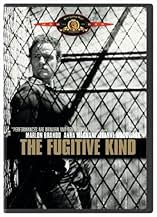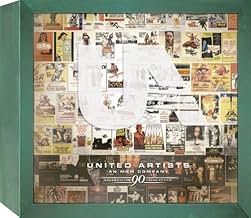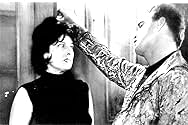AVALIAÇÃO DA IMDb
7,1/10
7,9 mil
SUA AVALIAÇÃO
Um andarilho que toca violão vagueia por uma pequena cidade do Mississippi e deixa duas mulheres problemáticas irritadas.Um andarilho que toca violão vagueia por uma pequena cidade do Mississippi e deixa duas mulheres problemáticas irritadas.Um andarilho que toca violão vagueia por uma pequena cidade do Mississippi e deixa duas mulheres problemáticas irritadas.
- Direção
- Roteiristas
- Artistas
- Prêmios
- 2 vitórias no total
Madame Spivy
- Ruby Lightfoot
- (as Spivy)
Jeanne Barr
- Bit Part
- (não creditado)
Avaliações em destaque
Based on the play "Orpheus Descending" by Tennessee Williams directed by Sidney Lumet with an exceptional cast: Marlon Brando, Anna Magnani, Joanne Woodward, Maureen Stapleton and Victor Jory. I saw it for the first time when I was still in my teens and I had an opaque, sticky memory of the film so when somebody suggested to see it on DVD I knew we were in for an opaque, sticky evening but, as it happens, I was dead wrong. "The Fugitive Kind" is riveting with an opening monologue by Brando that is astonishing. A 1960 Brando when he had still, I imagine. hopes to be the actor, the man he wanted to be. There is an animal innocence in his eyes in his moves. The magnificent Magnani, who learned her lines phonetically because she didn't know English presented Brando with a challenge as an actress and as a woman. I hear it wasn't pretty but the result is a feast for the eyes and the ears. The film may not be perfect but I don't think the original material was either so what we got here is a unique opportunity to see this enormous artists giving their whole. That alone makes it a collectors item.
It's set in smalltown Mississippi in the 1950s and follows a down-and-out character who is trying to turn his life around and the doomed relationships into which he stumbles.
Valentine Xavier (Marlon Brando), also know as Snakeskin because of the snakeskin jacket he wears, gets out of jail in New Orleans and hits the road. His car breaks down in the middle of a rainstorm in a little Mississippi town, so he stops and gets a job in a little mercantile store run by Lady Torrance (Anna Magnani). She's lonely and has an older sick husband, Jabe (Victor Jory), who doesn't trust her or the good-looking clerk she just hired, especially when she fixes up a little bedroom for Xavier in the back of the store.
Lady Torrance gets some competition from a young rich woman, Carol (Joanne Woodward), who is often drunk and remembers Xavier from New Orleans. She's too over the top to be real competition for Lady Torrence, however.
After Lady Torrence learns her husband was among an earlier group of vigilantes that burned down her father's vineyards and home with her father inside, she is determined to open a "confectionary" attached to the mercantile store, that is designed like a vineyard. She wants Jabe to see before she allows him to die.
However, there is a conflagration at the end that unhappily resolves the plot.
This is Tennessee Williams with his grimiest southern town filled with malfunctioning human relationships. There are only dim flares of hope throughout, only to be extinguished by the end. Marlon Brando, as one reviewer put it, is "an astonishing physical specimen, a statuesque hunk with the intellectual ennui of a philosopher, who moves with a panther-like ease" and is "the misfit we all want to be." Anna Magnani is the earthy older woman who is finally trying to grasp some joy from life. They are a potent combination, though I sometimes find Tennessee Williams' words to be overwrought.
Valentine Xavier (Marlon Brando), also know as Snakeskin because of the snakeskin jacket he wears, gets out of jail in New Orleans and hits the road. His car breaks down in the middle of a rainstorm in a little Mississippi town, so he stops and gets a job in a little mercantile store run by Lady Torrance (Anna Magnani). She's lonely and has an older sick husband, Jabe (Victor Jory), who doesn't trust her or the good-looking clerk she just hired, especially when she fixes up a little bedroom for Xavier in the back of the store.
Lady Torrance gets some competition from a young rich woman, Carol (Joanne Woodward), who is often drunk and remembers Xavier from New Orleans. She's too over the top to be real competition for Lady Torrence, however.
After Lady Torrence learns her husband was among an earlier group of vigilantes that burned down her father's vineyards and home with her father inside, she is determined to open a "confectionary" attached to the mercantile store, that is designed like a vineyard. She wants Jabe to see before she allows him to die.
However, there is a conflagration at the end that unhappily resolves the plot.
This is Tennessee Williams with his grimiest southern town filled with malfunctioning human relationships. There are only dim flares of hope throughout, only to be extinguished by the end. Marlon Brando, as one reviewer put it, is "an astonishing physical specimen, a statuesque hunk with the intellectual ennui of a philosopher, who moves with a panther-like ease" and is "the misfit we all want to be." Anna Magnani is the earthy older woman who is finally trying to grasp some joy from life. They are a potent combination, though I sometimes find Tennessee Williams' words to be overwrought.
I suspect that Tennessee Williams probably agreed to change the title of his classically sounding play Orpheus Descending to The Fugitive Kind in order to insure box office. Possibly some of Marlon Brando's fans garnered from The Wild One might pay their admissions thinking they were seeing something like that. I can think of worst ways to be exposed to one of America's most respected playwrights.
This was Brando's second time doing Williams for the screen, the first time being A Streetcar Named Desire. Curiously enough this was Anna Magnani's second time doing Tennessee Williams for the screen as well, she won an Oscar in 1955 for The Rose Tattoo. So the combination of Brando and Magnani seemed a natural for the screen. I don't think The Fugitive Kind is as good as Streetcar or The Rose Tattoo, but the parts are meaty enough roles for both these honored players.
Characters seem to drift in to The Fugitive Kind from other Williams work. Brando's Val Xavier is quite like Chance Wayne in Sweet Bird of Youth, in fact in the review's title is the illusion Brando himself makes of his character. He's an early 30 something drifter with a talent for sex and music, the former probably more than the latter.
Unlike Chance, Xavier doesn't have a female keeper, but he'd like to find one. He passes up liaison with the town trollop played by a third Oscar winner in the cast, Joanne Woodward for the older and married Anna Magnani.
Magnani is trapped in a loveless marriage to a dying Victor Jory, a petty tyrant who runs the town general store. Like Big Daddy in Cat on a Hot Tin Roof, Jory is dying of cancer at a much more advanced stage of the disease than Burl Ives had. Picture Big Mama from that play hot to trot for Chance Wayne and you've got the essence of The Fugitive Kind.
Joanne Woodward has an interesting part. Part of her loose behavior is in rebellion against the time honored tradition of institutional racism that is the south that Tennessee Williams grew up in. I'm not an expert on Tennessee Williams, but of the works I've seen that are revived frequently, this is the only one where Williams directly brings up racism.
Orpheus Descending on Broadway only ran 68 performances in 1957. Two members from the Broadway cast made it to the screen, R.G. Armstrong as the sheriff repeating his role and Maureen Stapleton who had Joanne Woodward's part on stage, essays the part of the sheriff's wife who also is married to another middle aged tyrant. Considered a lesser work of Williams at first, Orpheus Descending is now revived frequently by stock theater companies everywhere. A critically acclaimed revival on Broadway in 1989 with Vanessa Redgrave and Tammy Grimes and Kevin Anderson helped bring Orpheus Descending into its proper place in the sun.
Maybe if a remake is ever done, it will even be done under its proper original title. Till then we can be well satisfied with this version.
This was Brando's second time doing Williams for the screen, the first time being A Streetcar Named Desire. Curiously enough this was Anna Magnani's second time doing Tennessee Williams for the screen as well, she won an Oscar in 1955 for The Rose Tattoo. So the combination of Brando and Magnani seemed a natural for the screen. I don't think The Fugitive Kind is as good as Streetcar or The Rose Tattoo, but the parts are meaty enough roles for both these honored players.
Characters seem to drift in to The Fugitive Kind from other Williams work. Brando's Val Xavier is quite like Chance Wayne in Sweet Bird of Youth, in fact in the review's title is the illusion Brando himself makes of his character. He's an early 30 something drifter with a talent for sex and music, the former probably more than the latter.
Unlike Chance, Xavier doesn't have a female keeper, but he'd like to find one. He passes up liaison with the town trollop played by a third Oscar winner in the cast, Joanne Woodward for the older and married Anna Magnani.
Magnani is trapped in a loveless marriage to a dying Victor Jory, a petty tyrant who runs the town general store. Like Big Daddy in Cat on a Hot Tin Roof, Jory is dying of cancer at a much more advanced stage of the disease than Burl Ives had. Picture Big Mama from that play hot to trot for Chance Wayne and you've got the essence of The Fugitive Kind.
Joanne Woodward has an interesting part. Part of her loose behavior is in rebellion against the time honored tradition of institutional racism that is the south that Tennessee Williams grew up in. I'm not an expert on Tennessee Williams, but of the works I've seen that are revived frequently, this is the only one where Williams directly brings up racism.
Orpheus Descending on Broadway only ran 68 performances in 1957. Two members from the Broadway cast made it to the screen, R.G. Armstrong as the sheriff repeating his role and Maureen Stapleton who had Joanne Woodward's part on stage, essays the part of the sheriff's wife who also is married to another middle aged tyrant. Considered a lesser work of Williams at first, Orpheus Descending is now revived frequently by stock theater companies everywhere. A critically acclaimed revival on Broadway in 1989 with Vanessa Redgrave and Tammy Grimes and Kevin Anderson helped bring Orpheus Descending into its proper place in the sun.
Maybe if a remake is ever done, it will even be done under its proper original title. Till then we can be well satisfied with this version.
Released in 1960 and directed by Sidney Lumet from Tennessee Williams' screenplay, "The Fugitive Kind" is a B&W southern Gothic drama starring Marlon Brando as loner minstrel Val "Snakeskin" from New Orleans in pursuit of a new life and the people with whom to live it. He stumbles upon a Mississippi town and gets a job at a mercantile store, which is run by a lonely passed-her-prime woman, Lady (Anna Magnani). While Snakeskin works the store downstairs, Lady's terminally ill husband is bedridden upstairs (Victor Jory). Joanne Woodward plays a histrionic beatnik while Maureen Stapleton is on hand as a housewife enamored by Snakeskin. R.G. Armstrong appears as the redneck sheriff.
The first time I watched this movie (in 2008) I didn't much like it, probably because I wasn't familiar with Williams' stagey, melodramatic style of writing. However, after just viewing Williams' "The Night of the Iguana" (1964) and really appreciating it, I had a taste for more and so gave "The Fugitive Kind" a second chance. I'm glad I did because, this time, I was able to discern its highlights and got a lot more out of it.
Marlon was in the midst of my favorite period of his career while filming this movie. Arguably his greatest films, "The Young Lions" (1958), "One-Eyed Jacks" (1961) and "Mutiny on the Bounty" (1962), were all shot during this time. While "The Fugitive Kind" is easily the least of these it's worth checking out for a number of reasons, as long as you're in the mood for a talky adult melodrama. Like "The Night of the Iguana," this is a brooding rumination on the nature of existence. As such, there are numerous treasures to glean from the seemingly interminable dialogues. The movie's overlong and could've been tightened up, but the interspersed riches hidden within make it worth staying with, but you have to be a seasoned adult to appreciate it or, at least, mature for your years.
Woodward's beatnik character is interesting as she's basically a hippie before hippies existed. Although her character is histrionic and somewhat annoying, some of her reflections are poignant, like in the interesting cemetery scene with Snakeskin. Emory Richardson is almost fascinating as Carol's silent black friend in a racist community. Some of their platonic imagery together is unexpected and intriguing for a film shot in 1959.
Brando was 35 during filming and became the first actor to make $1 million for a single film (although Elizabeth Taylor earlier signed a $1 million contract for "Cleopatra," that movie wasn't released until 1963). Magnani was 51 and hot to sleep with the star, but Marlon didn't find her attractive which, needless to say, negatively affected the shoot. This is surprising because some of their scenes together are quite good. I incidentally had an Italian neighbor who passed away six weeks ago who was strikingly reminiscent of Magnani's character, both looks-wise and temperament-wise. So I know firsthand that people like her exist.
The film runs 119 minutes and was shot in Milton, New York.
GRADE: B
The first time I watched this movie (in 2008) I didn't much like it, probably because I wasn't familiar with Williams' stagey, melodramatic style of writing. However, after just viewing Williams' "The Night of the Iguana" (1964) and really appreciating it, I had a taste for more and so gave "The Fugitive Kind" a second chance. I'm glad I did because, this time, I was able to discern its highlights and got a lot more out of it.
Marlon was in the midst of my favorite period of his career while filming this movie. Arguably his greatest films, "The Young Lions" (1958), "One-Eyed Jacks" (1961) and "Mutiny on the Bounty" (1962), were all shot during this time. While "The Fugitive Kind" is easily the least of these it's worth checking out for a number of reasons, as long as you're in the mood for a talky adult melodrama. Like "The Night of the Iguana," this is a brooding rumination on the nature of existence. As such, there are numerous treasures to glean from the seemingly interminable dialogues. The movie's overlong and could've been tightened up, but the interspersed riches hidden within make it worth staying with, but you have to be a seasoned adult to appreciate it or, at least, mature for your years.
Woodward's beatnik character is interesting as she's basically a hippie before hippies existed. Although her character is histrionic and somewhat annoying, some of her reflections are poignant, like in the interesting cemetery scene with Snakeskin. Emory Richardson is almost fascinating as Carol's silent black friend in a racist community. Some of their platonic imagery together is unexpected and intriguing for a film shot in 1959.
Brando was 35 during filming and became the first actor to make $1 million for a single film (although Elizabeth Taylor earlier signed a $1 million contract for "Cleopatra," that movie wasn't released until 1963). Magnani was 51 and hot to sleep with the star, but Marlon didn't find her attractive which, needless to say, negatively affected the shoot. This is surprising because some of their scenes together are quite good. I incidentally had an Italian neighbor who passed away six weeks ago who was strikingly reminiscent of Magnani's character, both looks-wise and temperament-wise. So I know firsthand that people like her exist.
The film runs 119 minutes and was shot in Milton, New York.
GRADE: B
This is not a well-written film, but the acting is phenomenal. Brando and Magnani have really great chemistry and that's what carries the film. It is the acting of these two that make me want to watch this film time and time again. I didn't necessarily like Joanne Woodward in her role, it just didn't seem to fit her. It seemed like she was trying too hard or something, so I just tuned her out. But I was always tuned into Brando--its just something about him that just pulls you in--wondering what he'll do next in the scene. Anyway, The cinematography is great and adds to the moodiness of the film. Overall, the movie isn't necessarily Brando's greatest film, but it's by no means one of his worst. Unfortunately, there wasn't much to work with as far as the script, so the acting had to carry the film.
Você sabia?
- CuriosidadesMarlon Brando described Anna Magnani as being equally fiery and passionate off screen. He claimed she made a pass at him in a hotel before filming began.
- Erros de gravaçãoAt the cemetery, Xavier returns to the car and turns on its headlights. A much brighter studio light comes on a beat too late to further illuminate the right side of the frame.
- Citações
Lady Torrance: Tell me some more about your self-control.
Valentine Xavier: Well, they say that a woman can burn a man down, you know? But I can burn a woman down. I'm saying that I could. I'm not saying I would.
Lady Torrance: What's the matter? Have they tired you out?
Valentine Xavier: No, I'm not tired.
- ConexõesFeatured in American Masters: Tennessee Williams: Orpheus of the American Stage (1994)
Principais escolhas
Faça login para avaliar e ver a lista de recomendações personalizadas
- How long is The Fugitive Kind?Fornecido pela Alexa
Detalhes
- Data de lançamento
- País de origem
- Idioma
- Também conhecido como
- El hombre de la piel de víbora
- Locações de filme
- Empresa de produção
- Consulte mais créditos da empresa na IMDbPro
Bilheteria
- Orçamento
- US$ 2.000.000 (estimativa)
- Tempo de duração
- 1 h 59 min(119 min)
- Cor
- Proporção
- 1.66 : 1
Contribua para esta página
Sugerir uma alteração ou adicionar conteúdo ausente


